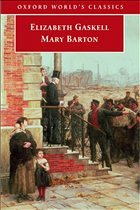- This new edition reproduces the last edition of the novel supervised by Elizabeth Gaskell herself and includes 'Two Lectures on the Lancashire Dialect by the Rev. W. Gaskell'.
- The Introduction provides historical and biographical context to the novel, a survey of critical responses to Mary Barton, and argues that Gaskell is chiefly concerned with the importance of communication as a means of healing breaches between people.
- Up-to-date critical bibliography.
- Revised and updated notes.
- Appendixes include Gaskell's rough draft of the novel and her outline of the novel's conclusion.
New to this edition
- Introduction, which provides historical and biographical context to the novel, a survey of critical responses to Mary Barton, and argues that Gaskell is chiefly concerned with the importance of communication as a means of healing breaches between people.
- Select Bibliography.
- Choice of text: the text is that of the fifth edition replaces the unreliable third edition
- New Notes
- New appendix: two lectures on the Lancashire dialect by Gaskell's husband, appended to the fifth edition
'It's the masters as has wrought this woe; it's the masters as should pay for it.'
Set in Manchester in the 1840s - a period of industrial unrest and extreme deprivation - Mary Barton depicts the effects of economic and physical hardship upon the city's working-class community. Paralleling the novel's treatment of the relationship between masters and men, the suffering of the poor, and the workmen's angry response, is the story of Mary herself: a factory-worker's daughter who attracts the attentions of the mill-owner's son, she becomes caught up in the violence of class conflict when a brutal murder forces her to confront her true feelings and allegiances.
Mary Barton was praised by contemporary critics for its vivid realism, its convincing characters and its deep sympathy with the poor, and it still has the power to engage and move readers today. This edition reproduces the last edition of the novel supervised by Elizabeth Gaskell and includes her husband's two lectures on the Lancashire dialect.
- The Introduction provides historical and biographical context to the novel, a survey of critical responses to Mary Barton, and argues that Gaskell is chiefly concerned with the importance of communication as a means of healing breaches between people.
- Up-to-date critical bibliography.
- Revised and updated notes.
- Appendixes include Gaskell's rough draft of the novel and her outline of the novel's conclusion.
New to this edition
- Introduction, which provides historical and biographical context to the novel, a survey of critical responses to Mary Barton, and argues that Gaskell is chiefly concerned with the importance of communication as a means of healing breaches between people.
- Select Bibliography.
- Choice of text: the text is that of the fifth edition replaces the unreliable third edition
- New Notes
- New appendix: two lectures on the Lancashire dialect by Gaskell's husband, appended to the fifth edition
'It's the masters as has wrought this woe; it's the masters as should pay for it.'
Set in Manchester in the 1840s - a period of industrial unrest and extreme deprivation - Mary Barton depicts the effects of economic and physical hardship upon the city's working-class community. Paralleling the novel's treatment of the relationship between masters and men, the suffering of the poor, and the workmen's angry response, is the story of Mary herself: a factory-worker's daughter who attracts the attentions of the mill-owner's son, she becomes caught up in the violence of class conflict when a brutal murder forces her to confront her true feelings and allegiances.
Mary Barton was praised by contemporary critics for its vivid realism, its convincing characters and its deep sympathy with the poor, and it still has the power to engage and move readers today. This edition reproduces the last edition of the novel supervised by Elizabeth Gaskell and includes her husband's two lectures on the Lancashire dialect.

